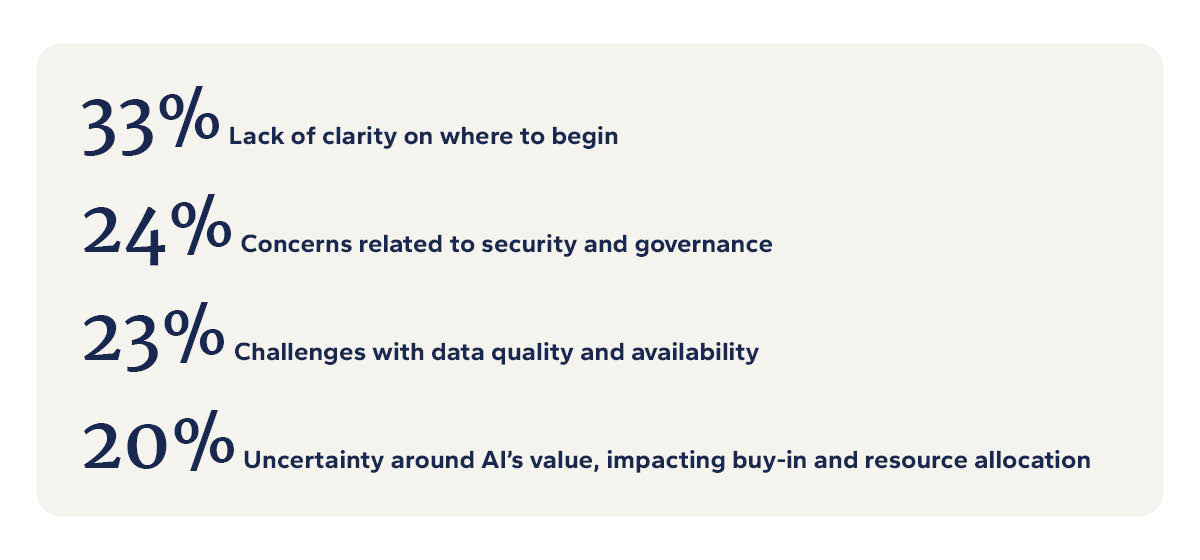Key Takeaways
- AI success depends on high-quality data, security, and governance practices.
- Organizations must assess their processes to identify where AI can create the most impact.
- Prioritizing data and developing a strategic AI roadmap is key to navigating challenges.
AI presents incredible opportunities for organizations, from enhancing efficiency and personalizing the customer experience to allowing for more in-depth forecasting and modeling. However, AI systems require large amounts of data for operation and training. This creates challenges for organizations related to their data quality, security, and availability. Addressing these challenges is crucial, as the reliability of AI is directly related to the quality of the data it uses.
While AI promises to revolutionize business operations, its success hinges on how organizations manage and optimize their data.
Poor data quality, inadequate security, and governance issues can hamper the most ambitious AI strategies. Implementing AI in your organization requires a strategic plan focusing on your data and understanding where AI will make the biggest impact.
Maximizing the Value of AI
AI is not one-size-fits-all. To maximize its value, you must first understand your objectives and how AI can help you meet them. Begin by conducting a thorough assessment of your business processes to identify areas where AI can create efficiencies or uncover new opportunities. For instance, automating repetitive tasks can free up your team for more strategic work, while AI can uncover valuable insights from customer data to guide decision-making.
Watch the recording below to see how organizations are leveraging AI.
Navigating AI Challenges
We recently asked organizations which obstacle they find most challenging for fully harnessing AI:

To navigate these challenges and apply AI strategically, organizations must prioritize their data.
Data Quality and Availability
To get your data ready to leverage in AI tools, follow these steps:
- Consolidate and model your data: Ensure all business-critical data is unified in one place. For example, merge customer, financial, and operational data to gain a complete view.
- Create a single version of the truth: Ensure consistent, synchronized data across the organization to eliminate discrepancies and support uniform decision-making.
- Pick your platform(s): Select scalable AI and data platforms that meet your organization’s needs. This doesn’t always mean implementing new technology; many systems have built-in AI.
- Eliminate data silos: Breaking down barriers between departments and systems can help uncover hidden insights. For instance, integrating marketing and sales data can enhance customer targeting efforts.
- Enrich your internal data with external data sources: Enhance internal datasets with relevant external data to improve AI insights. For example, enrich shipping data with weather forecasts to optimize delivery routes.
- Identify your highest quality or differentiating data: Focus on refining and leveraging high-quality, unique data. For example, use proprietary customer behavior data to improve product recommendations and boost subscription renewals.
Security
Securing structured and unstructured data has never been more important. Not only is it vital for your organization’s security, but industries like healthcare and financial services have developed regulatory requirements around AI usage. You must understand the tools you’re using and the tools your people have access to. The key to success lies in educating your employees on how to use AI tools safely and effectively.
Governance
A governance framework ensures that your technology meets your organization’s needs. This requires input and cross-functional collaboration from all areas of your organization. To create a scalable governance framework, you must understand where you are now and where you want to go. Regular reviews and updates ensure that your data governance and AI practices keep pace with technological advancements and changing business needs.
- Gauge your digital maturity and discover resources to help get your organization ready for AI. Take the Assessment.
Creating a Roadmap and Action Plan
At Eide Bailly, we bring our knowledge, passion, and expertise to transform the way our clients do business.
Our AI Assessment Methodology:

Our team can help you develop a roadmap that prioritizes AI initiatives based on business impact. We’ll outline several use cases where AI has the potential to significantly impact your organization and walk you through an investment expectation, ROI analysis, and plans for data governance and security.
Is Your Organization Ready for Generative AI?

Digital
Data
Who We Are
Eide Bailly is a CPA firm bringing practical expertise in tax, audit, and advisory to help you perform, protect, and prosper with confidence.


